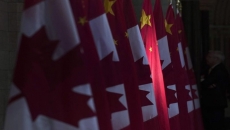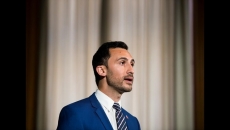The president of Mexico is in Washington to meet with President Donald Trump and celebrate North America's new trade deal — a celebration in which Canada is not taking part.
Prime Minister Justin Trudeau declined to join the talks, citing the ongoing COVID-19 pandemic, this week's pressing parliamentary business and the continuing threat of renewed U.S. tariffs against Canadian aluminum exports.
The coming into force of the new U.S.-Mexico-Canada Agreement is a win for all three countries at a time of serious economic uncertainty, Trudeau said Wednesday as he suggested — without stating directly — that he intends to discuss the matter with Trump in the near future.
"I speak reasonably regularly, and have over the past many years, with the U.S. president, and look forward to congratulating him and all of us on the coming into force of the new NAFTA, the USMCA," the prime minister told a news conference.
"I think it's really important that at a time of economic strain and stress that we continue to have access to the world's most important market. This is good for Canadian workers and Canadian jobs right across the country."
The formal debut of the agreement, which took effect last week, was sullied by the U.S. trade representative's claim that Canada has exceeded limits on aluminum exports to the United States established when Trump lifted national-security tariffs on Canadian-made steel and aluminum in May 2019.
The threat of renewed tariffs "is a little bit difficult to understand," Trudeau said.
"The U.S. doesn't make nearly enough aluminum to be able to cover its needs, particularly at a time when we want economies to get going again across North America. What tariffs would do would be to raise prices for manufacturers in the United States and put extra stresses on them at a time when stresses abound."
Higher prices may be precisely the goal: the two U.S. producers that are urging the USTR to take action have ties to a Swiss metals company that holds the exclusive rights to sell Russian-made aluminum in the United States. China, Russia, India and Canada are the four largest aluminum producers in the world.
Mexican President Andres Manuel Lopez Obrador's visit to Washington, his first foreign trip since being elected in 2018, has prompted widespread criticism at home for a leader whose campaign trafficked heavily in criticizing Trump.
Since then, the leader known in Mexico as AMLO has been pilloried for his deference to a U.S. president famous for aggressive anti-immigration policies at the southern border.
With a U.S. presidential election now just four months away, it's Trump who stands to benefit politically from a bilateral visit, experts told a Wilson Center panel discussion Wednesday — and if Lopez Obrador hopes to secure safe harbour from Trump's unpredictable foreign-policy whims, he may be sadly mistaken.
"If he thinks that going to Washington in this moment ... is going to insulate him or protect him from future actions by this president, especially in a campaign year — against tariffs, against some kind of other punitive measure — I think he's fooling himself," said Roberta Jacobson, a former U.S. ambassador to Mexico under both Trump and his predecessor Barack Obama.
"Witness the fact that obviously we have the discussion of aluminum tariffs vis-a-vis Canada right now, as we're celebrating USMCA. This is not a president who necessarily says, 'These are my new partners, I will not penalize them no matter what.'"






